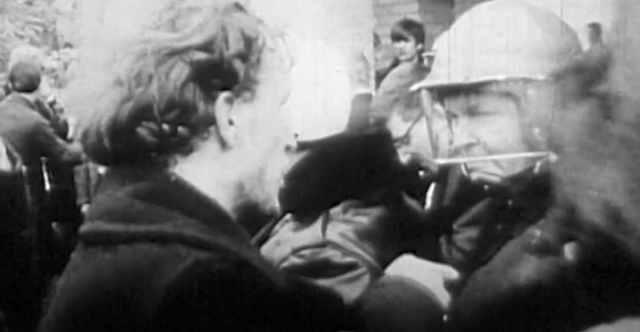 An exchange of blows to the body, a taste of tear gas and a peaceful protest turned violent — this is how the Day of Dow in Madison is remembered.
An exchange of blows to the body, a taste of tear gas and a peaceful protest turned violent — this is how the Day of Dow in Madison is remembered.
Opposition to the Vietnam War had been escalating on college campuses across the nation and tensions were particularly high at UW-Madison. In an effort to recruit and hire students, Dow Chemical — a company that made napalm used in the war — was set to arrive at the university on Oct. 18, 1967.
In the hopes of blocking the Dow Chemical company interviews, nearly 250 demonstrators gathered inside the building where the recruiting was set to take place. Students marched into the Commerce Building, now known as Ingraham Hall, and filled the hallway from wall to wall, forming a human blockade. They vowed not to leave until the university stopped Dow Chemical from recruiting on campus.

“Dow Chemical company was making napalm, which they were dropping on Vietnamese people and children. Innocent people were dying because they were making this product,” Jane Madell, one of those protesters, told Madison365. “A lot of us felt that the United States and the university should not be allowed to recruit on campus — we were not going to contribute to the war.”
According to the university, a crowd of at least 2,000 and perhaps as many as 5,000 also protested outside of the building. When students inside the Commerce Building continued to stand their ground, the university called on the Madison police to clear the area.
In a PBS documentary about the Day of Dow, “Two Days in October,” a police officer who was there during the protest said the university didn’t specify how they wanted the students removed.
At the cusp of the demonstration, the actions turned to blatant violence.

“You grab somebody, you hit somebody and knock them down, and you step over them,” he said in the documentary. “We had stacked up bodies like cordwood between the doors.”
More than 150 Madison police officers, armed with billy clubs and tear gas, tried to forcibly remove the students. Nearly 50 students were reported to have been treated for injuries at hospitals.
“The police were attacking us with clubs — what could we be except nervous? It was violent,” Madell recalled of the event. “It was as if they didn’t understand that we had a legal right to protest. They just started attacking people and it was horrible.”
Some students fought back with items like rocks, sticks, pipes, shoes and bricks, according to the university’s Dow project, “A Turning Point.” Nineteen police officers were taken to local hospitals to be treated for injuries as a result.
While some say students were instigating police officers throughout the protest, Madell, who was a graduate student at the time, says she remembers differently.
“I felt that the students were acting within their right to try to make change,” said Madell, who now lives in New York City. “The fact that UW-Madison, a very progressive institution, was allowing Dow Chemical to recruit students for an activity that was going to be murder is unjustifiable.”
The protest lasted almost seven hours, and it was the first violent student protest of the Vietnam era at a major university. It was also the first time that tear gas was used on the UW-Madison campus. For many who were there during the events, the Day of Dow is forever etched into their memories.
Madell, in particular, will always remember the protest as an “absolute success.” She said the Day of Dow and other protests across the nation were significant in ending the Vietnam War, leaving her feeling empowered to continue making change as a young adult.
In fact, she said youth today have that same power to make change now more than ever.
“Young people are understanding now that they have a right to stand up for what they believe in and if they do, they can change things,” she said. “I think that is the most hopeful thing we can say for this country right now.”
According to Madell, it’s important to continue remembering the Day of Dow and its outcome, especially in today’s divisive political climate.
“Everybody has an obligation to do what they think is right if we want to see change in this world,” she said. “We’re in a terrible time in this country right now politically. We can’t sit back. We have to stand up and be counted — we are all responsible.”




























